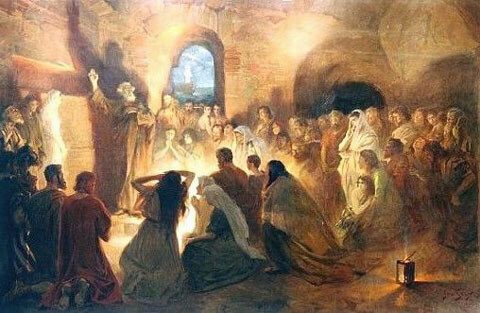
Trust is an important element of faith, but faith cannot be reduced to it. It is the constant Protestant reductionism and either/or mentality that we object to. See: The Catholic Encyclopedia: “Faith”. Excerpt:
In the New Testament the meanings “to believe” and “belief”, for pisteon and pistis, come to the fore; in Christ’s speech, pistis frequently means “trust”, but also “belief” (cf. Matthew 8:10). In Acts it is used objectively of the tenets of the Christians, but is often to be rendered “belief” (cf. 17:31; 20:21; 26:8). In Romans 14:23, it has the meaning of “conscience” — “all that is not of faith is sin” — but the Apostle repeatedly uses it in the sense of “belief” (cf. Romans 4 and Galatians 3).
The Catechism of the Catholic Church:
215 . . . God is Truth itself, whose words cannot deceive. This is why one can abandon oneself in full trust to the truth and faithfulness of his word in all things. . . .
227 It means trusting God in every circumstance, even in adversity. A prayer of St. Teresa of Jesus wonderfully expresses this trust: . . .[under the section heading: “IV. THE IMPLICATIONS OF FAITH IN ONE GOD”]
304 . . . This is not a “primitive mode of speech”, but a profound way of recalling God’s primacy and absolute Lordship over history and the world, and so of educating his people to trust in him. The prayer of the Psalms is the great school of this trust.
322 Christ invites us to filial trust in the providence of our heavenly Father (cf. Mt 6:26-34), and St. Peter the apostle repeats: “Cast all your anxieties on him, for he cares about you” (I Pt 5:7; cf. Ps 55:23).396 . . . The “tree of the knowledge of good and evil”symbolically evokes the insurmountable limits that man, being a creature, must freely recognize and respect with trust. . . .
397 Man, tempted by the devil, let his trust in his Creator die in his heart and, abusing his freedom, disobeyed God’s command. This is what man’s first sin consisted of. All subsequent sin would be disobedience toward God and lack of trust in his goodness.
448 Very often in the Gospels people address Jesus as “Lord”. This title testifies to the respect and trust of those who approach him for help and healing. . . .
451 Christian prayer is characterized by the title “Lord”, whether in the invitation to prayer (“The Lord be with you”), its conclusion (“through Christ our Lord”) or the exclamation full of trust and hope: Maran atha (“Our Lord, come!”) or Marana tha (“Come, Lord!”) – “Amen Come Lord Jesus!”
1062 In Hebrew, amen comes from the same root as the word “believe.” This root expresses solidity, trustworthiness, faithfulness. And so we can understand why “Amen” may express both God’s faithfulness towards us and our trust in him.
1431 Interior repentance is a radical reorientation of our whole life, a return, a conversion to God with all our heart, an end of sin, a turning away from evil, with repugnance toward the evil actions we have committed. At the same time it entails the desire and resolution to change one’s life, with hope in God’s mercy and trust in the help of his grace. This conversion of heart is accompanied by a salutary pain and sadness which the Fathers called animi cruciatus (affliction of spirit) and compunctio cordis (repentance of heart).
1520 . . . the Holy Spirit, who renews trust and faith in God . . .
1817 Hope is the theological virtue by which we desire the kingdom of heaven and eternal life as our happiness, placing our trust in Christ’s promises and relying not on our own strength, but on the help of the grace of the Holy Spirit. . . .
1843 By hope we desire, and with steadfast trust await from God, eternal life and the graces to merit it.
2119 . . . The challenge contained in such tempting of God wounds the respect and trust we owe our Creator and Lord. It always harbors doubt about his love, his providence, and his power.
2547 . . . Abandonment to the providence of the Father in heaven frees us from anxiety about tomorrow. Trust in God is a preparation for the blessedness of the poor. They shall see God.
2579 . . . His prayer, the prayer of God’s Anointed, is a faithful adherence to the divine promise and expresses a loving and joyful trust in God, the only King and Lord. . . .
2592 The prayer of Abraham and Jacob is presented as a battle of faith marked by trust in God’s faithfulness and by certitude in the victory promised to perseverance.
2728 . . . what good does it do to pray? To overcome these obstacles, we must battle to gain humility, trust, and perseverance.
2733 . . . The humble are not surprised by their distress; it leads them to trust more, to hold fast in constancy.
2734 Filial trust is tested – it proves itself – in tribulation. . . .2738 The revelation of prayer in the economy of salvation teaches us that faithrests on God’s action in history. Our filial trust is enkindled by his supreme act: the Passion and Resurrection of his Son. Christian prayer is cooperation with his providence, his plan of love for men.
2739 For St. Paul, this trust is bold, founded on the prayer of the Spirit in us and on the faithful love of the Father who has given us his only Son. . . .
2741 . . . If our prayer is resolutely united with that of Jesus, in trust and boldness as children, we obtain all that we ask in his name, even more than any particular thing: the Holy Spirit himself, who contains all gifts.
2756 Filial trust is put to the test when we feel that our prayer is not always heard. . . .
2778 This power of the Spirit who introduces us to the Lord’s Prayer is expressed in the liturgies of East and of West by the beautiful, characteristically Christian expression: parrhesia, straightforward simplicity, filial trust, joyous assurance, humble boldness, the certainty of being loved.
2797 Simple and faithful trust, humble and joyous assurance are the proper dispositions for one who prays the Our Father.
2828 “Give us”: The trust of children who look to their Father for everything is beautiful. . . .
2830 . . . In the Sermon on the Mount, Jesus insists on the filial trust that cooperates with our Father’s providence. . . .
2837 “Daily” (epiousios) occurs nowhere else in the New Testament. Taken in a temporal sense, this word is a pedagogical repetition of “this day,” to confirm us in trust “without reservation.”
2861 In the fourth petition, by saying “give us,” we express in communion with our brethren our filial trust in our heavenly Father. . . .
See also Pope Benedict XVI’s encyclical Spe Salvi (Saved by Hope), of November 30, 2007. See also:
Council of Trent:
Decree on Justification; CHAPTER XVI. On the fruit of Justification, that is, on the merit of good works, and on the nature of that merit.
. . . nevertheless God forbid that a Christian should either trust or glory in himself, and not in the Lord, whose bounty towards all [Page 44] men is so great, that He will have the things which are His own gifts be their merits.
Canons on Justification
CANON XXI.-If any one saith, that Christ Jesus was given of God to men, as a redeemer in whom to trust, and not also as a legislator whom to obey; let him be anathema.
[Note that this is not opposed to trust itself, but to the “either/or” exclusion of obedience alongside trust]
On the Most Holy Sacraments of Penance and Extreme Unction: On the Sacrament of Extreme Unction [Prologue]
For though our adversary seeks and seizes opportunities, all our life long, to be able in any way to devour our souls; yet is there no time wherein he strains more vehemently all the powers of his craft to ruin us utterly, and, if he can possibly, to make us fall even from trust in the mercy of God, than when he perceives the end of our life to be at hand.
See Trent online.
Expository Dictionary of New Testament Words (W. E. Vine) makes it very clear that pistis (“Faith”) contains the elements of belief and trust, precisely as in Catholic teaching (the biblical “both/and”), whereas Protestantism (at least in some circles) greatly overemphasizes the trust element, so that it is out of balance (the over-rationalistic “either/or”):
primarily, “firm persuasion,” a conviction based upon hearing (akin to peitho, “to persuade”), is used in the NT always of “faith in God or Christ, or things spiritual.”
The word is used of (a) trust, e.g., Rom. 3:25 [see Note (4) below]; 1 Cor. 2:5; 15:14,17; 2 Cor. 1:24; Gal. 3:23 [see Note (5) below]; Phil. 1:25; 2:17; 1 Thess. 3:2; 2 Thess. 1:3; 3:2; (b) trust-worthiness, e.g., Matt. 23:23; Rom. 3:3, RV, “the faithfulness of God;” Gal. 5:22 (RV, “faithfulness”); Titus 2:10, “fidelity;” (c) by metonymy, what is believed, the contents of belief, the “faith,” Acts 6:7; 14:22; Gal. 1:23; 3:25 [contrast Gal. 3:23, under (a)]; Gal. 6:10; Phil. 1:27; 1 Thess. 3:10; Jude 1:3,20 (and perhaps 2 Thess. 3:2); (d) a ground for “faith,” an assurance, Acts 17:31 (not as in AV, marg., “offered faith”); (e) a pledge of fidelity, plighted “faith,” 1 Tim. 5:12.
The main elements in “faith” in its relation to the invisible God, as distinct from “faith” in man, are especially brought out in the use of this noun and the corresponding verb, pisteuo; they are (1) a firm conviction, producing a full acknowledgement of God’s revelation or truth, e.g., 2 Thess. 2:11,12; (2) a personal surrender to Him, John 1:12; (3) a conduct inspired by such surrender, 2 Cor. 5:7. Prominence is given to one or other of these elements according to the context. All this stands in contrast to belief in its purely natural exercise, which consists of an opinion held in good “faith” without necessary reference to its proof. The object of Abraham’s “faith” was not God’s promise (that was the occasion of its exercise); his “faith” rested on God Himself, Rom. 4:17,20,21.
See ASSURANCE, BELIEF, FAITHFULNESS, FIDELITY.
Kittel’s Theological Dictionary of the New Testament reiterates the same things, in extreme detail. To summarize: just as Protestants err if they reduce faith to mere “fiducial faith”, it is also an error to the opposite extreme to exclude all semblance of “trust” from the definition of faith.
***
(originally 1-8-10)
Photo credit: Saint Peter Preaching the Gospel in the Catacombs, by Jan Styka (1858-1925) [public domain / Wikimedia Commons]
***













